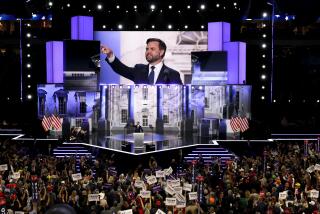Congressional Quicksand on Nicaragua
“Mr. President,” the Democratic Speaker of the House might have said, “this defector you have paraded before us on the eve of the Contra aid vote reminds us once again of the unworkable and dangerous policy you are asking us to fund in Central America. What have hundreds of millions of dollars in public, private and secret Contra aid bought? The Nicaraguans are responding by building up their military capacity with Soviet aid--exactly what we ought to be discouraging. More Contra aid will just bring more of the same. The policy has failed. It’s time to change course. It’s time to back Costa Rican President Oscar Arias Sanchez’s request that we cut aid to the Contras and throw our full weight behind supporting the peace plan.”
Of course, Speaker Jim Wright said nothing of the kind. He, like other Democrats, rolled over in the face of this carefully timed maneuver, blaming the Sandinistas for “snatching defeat from the jaws of victory” when he should have been attacking the Reagan Administration.
But why was it so difficult to counter the White House on Nicaragua?
The problem is rooted in years of the Democrats’ willingness to allow themselves to be trapped by the Reagan agenda in Central America. They have bought the assumption that vital security interests are really at stake in Nicaragua. Exaggerated rhetoric about Soviet beachheads and missiles, thousands of Cuban military advisers, potential Nicaraguan aggression against its neighbors and the exporting of revolution went largely unchallenged as Democrats focused instead on the corruption, incompetence and brutality of the Contras.
In fact, there were never any missiles in Nicaragua, or any intelligence suggesting that they were planned. The country’s military capability is severely limited by its small size and poverty; its gross national product is less than the budget of South Carolina. The Cuban advisers and aid from the Soviet Bloc were part of an overall strategic response to the U.S. threat and the Contra war. And as long as the Nicaraguans believe that Washington wants to destabilize them, with or without the Contras, a military buildup is a rational move.
For years the real but relatively minor security concerns of the United States could have been resolved through multilateral negotiations. But the Administration undermined each such attempt--the 1982 Mexico and Venezuela proposals, the 1984 and 1986 Contadora draft treaties and the Arias peace plan, to name a few. Because the Democrats never mounted a sustained attack on the Reagan agenda and its lack of concern with real security, the Administration was able to create the notion that there were dramatic, vital security interests at stake.
Enter Roger Miranda Bengoechea, the defector. Planned Soviet aid and continued buildup in Nicaragua were made to fit into the image of a security threat--and the Democrats were cowed.
Had the Democrats been challenging the Administration’s lies and distortions all along, the defector’s “revelations” would not only have supported attacks on the dangers of further Contra aid, they also would have been grist for further attacks against the White House myths.
There was no evidence to support the Administration myth of Nicaragua’s aggressive intent against its neighbors: Most of the military buildup was aimed at expanding the militia and reserve units--clearly a home defense force of citizens armed with rifles and with limited training. The only plans that Miranda revealed for actions in other countries were in the event of a U.S. invasion of Nicaragua.
There was no evidence to support the Administration myth that Nicaraguan aid is a significant factor in the Salvadoran civil war. On the contrary, Miranda pointed to some training of Salvadoran guerrillas but said that the level of aid dropped substantially after 1983, and that since the August peace accord--which bans aid to guerrilla groups--the government has tried to reduce the activities of Salvadoran guerrillas in Nicaragua.
Further, Miranda debunked the Administration claim of thousands of Cuban military advisers operating in Nicaragua. He put the number at 500, about what the Sandinistas have claimed all along.
Perhaps the most important charge that the Democrats could have leveled at the Administration is that the defector affair demonstrates once again that the White House is not really concerned about security--but only in trying to trap the Democrats with the issue. If security were such a big deal, why didn’t President Reagan raise the defector’s “revelations” with Soviet leader Mikhail S. Gorbachev at their summit meeting? And, even more seriously, when Gorbachev offered to negotiate an end to Soviet arms shipments to Nicaragua, why didn’t Reagan pursue it? A prominent State Department official suggested that from the start the defector was a useful pawn in domestic political terms: “Miranda was for the press and Congress, not for Gorbachev.”
Many Democrats know that Contra aid is counterproductive, dangerous and immoral. But until they vigorously challenge the lies and distortions by learning the truth and telling it to the American public and by boldly redefining the agenda, they will be standing on quicksand and the Administration will continue to suck them in.
More to Read
Get the L.A. Times Politics newsletter
Deeply reported insights into legislation, politics and policy from Sacramento, Washington and beyond. In your inbox three times per week.
You may occasionally receive promotional content from the Los Angeles Times.










